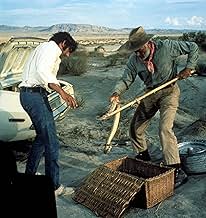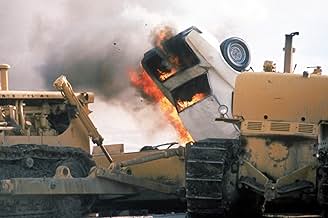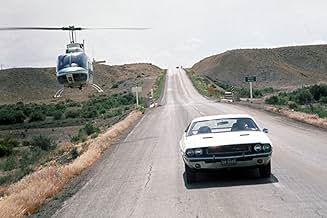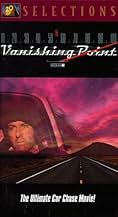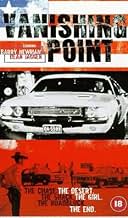During the 1970s, car-delivery driver Kowalski delivers hot rods in record time, but always runs into trouble.During the 1970s, car-delivery driver Kowalski delivers hot rods in record time, but always runs into trouble.During the 1970s, car-delivery driver Kowalski delivers hot rods in record time, but always runs into trouble.
- Director
- Writers
- Stars
- Awards
- 1 nomination total
Charlotte Rampling
- Hitch-Hiker
- (scenes deleted)
Robert Donner
- Deputy Collins
- (as Bob Donner)
- Director
- Writers
- All cast & crew
- Production, box office & more at IMDbPro
Featured reviews
Kowalski transports cars across the western US in 1970. He gets a gig transporting a 1970 Dodge Challenger R/T from Denver to San Francisco and sets out at maximum warp, stopping only for gas and strategy. He commits no crime outside of speeding, and fleeing the cops who are trying to stop him simply because he will not stop. He finds allies along the way, including an old prospector, a DJ named Super Soul, and a hippie who seems to me to be an alternate ending to the life of Peter Fonda's character Wyatt in "Easy Rider". He drives and drives and drives until he meets his destiny in a tiny town on the California-Nevada border at 10:04 AM on some unnamed Sunday.
Why? Is it because of his past; ex-cop, ex-racer, tragically bereaved? Is it because of the truckload of speed he takes at the beginning of the movie (draw your own metaphors between Kowalski's internal use of the noun and external use of the verb)?
Or is it the road, the infinite expanses of the Southwest, the silence, the freedom, the sound of the motor surging, the tires spinning, the wheels gobbling up and sitting out the black asphalt? Who knows? Kowalski seems indifferent as to why he drives, only that he must drive, must evade, must get to where he is going and will not - can not - be stopped.
Do yourself a favor. Rent the original, don't see the '97 made for TV movie (it has some high points, but it's like watching the '99 "Psycho" before seeing the Alfred Hitchcock original). In fact, rent this and "Two Lane Blacktop" from Monte Hellman, and "Mad Max" and/or "The Road Warrior". Watch all of them in as close to one sitting as you can get.
If after watching these movies, you don't understand how they're expressions of the same call to the open road, return them and give up. Not everyone was meant to hear it, just like not everyone has perfect pitch or the ability to wiggle their ears.
This movie drove me (pun intended) to take the handle kowalski and buy a Challenger of my own (flame red, 1973, you see the 1970 R/Ts are very hard to get).
It probably won't do the same for you, but if you've ever been driving down the open road and wondered what would happen if you _didn't_ get off at the next exchange, in fact if you never got off at all, then this film is for you.
And I hope the next ignoramus who compares this masterful film to "The Dukes of Hazzard" loses his brakes and plows into a line of parked Harleys outside some bar with a name like Whiskey Junction or the Dew Drop Inn.
Why? Is it because of his past; ex-cop, ex-racer, tragically bereaved? Is it because of the truckload of speed he takes at the beginning of the movie (draw your own metaphors between Kowalski's internal use of the noun and external use of the verb)?
Or is it the road, the infinite expanses of the Southwest, the silence, the freedom, the sound of the motor surging, the tires spinning, the wheels gobbling up and sitting out the black asphalt? Who knows? Kowalski seems indifferent as to why he drives, only that he must drive, must evade, must get to where he is going and will not - can not - be stopped.
Do yourself a favor. Rent the original, don't see the '97 made for TV movie (it has some high points, but it's like watching the '99 "Psycho" before seeing the Alfred Hitchcock original). In fact, rent this and "Two Lane Blacktop" from Monte Hellman, and "Mad Max" and/or "The Road Warrior". Watch all of them in as close to one sitting as you can get.
If after watching these movies, you don't understand how they're expressions of the same call to the open road, return them and give up. Not everyone was meant to hear it, just like not everyone has perfect pitch or the ability to wiggle their ears.
This movie drove me (pun intended) to take the handle kowalski and buy a Challenger of my own (flame red, 1973, you see the 1970 R/Ts are very hard to get).
It probably won't do the same for you, but if you've ever been driving down the open road and wondered what would happen if you _didn't_ get off at the next exchange, in fact if you never got off at all, then this film is for you.
And I hope the next ignoramus who compares this masterful film to "The Dukes of Hazzard" loses his brakes and plows into a line of parked Harleys outside some bar with a name like Whiskey Junction or the Dew Drop Inn.
Barry Newman is "Kowalski", an enigmatic figure who has tried everything in his life from stock car racing to the military, and failed at every one of his endeavors. Working as an auto delivery man, he gets an order to transport a 1970 Dodge Challenger R/T to San Francisco, and makes a bet with a few friends that it can be done in an impossibly short time. After loading up on "ups" and throttling the car westward, he is soon pursued vigorously by the police and embraced by the public as something of a hero. During a time when national speed limits were all controversy, this film provides a compelling argument against them: A fast car in the hands of a capable driver is not dangerous. Even the police, so caught up in their own system, don't realize that they are the only ones causing accidents and endangering the public while blindly trying to keep up with and capture Kowalski.
While the film sounds at first to be a simple action film, it's really much more than that. Kowalksi's past is revealed little by little through flashbacks, making the film something of a character study. Kowalski's trip becomes a road trip of existentialism as he runs across various strange characters: Solitary hippies, gay bandits, a boogie-woogie snake handling Christian cult, and the blind soul station DJ (brilliantly played by Cleavon Little) who is attempting to guide him on his journey from within the car's radio.
Topping it off is a great soundtrack, breathtaking cinematography and direction, and automotive action that has seen no equal. This film manages to be both compelling and exciting. Just watch it already.
10/10
While the film sounds at first to be a simple action film, it's really much more than that. Kowalksi's past is revealed little by little through flashbacks, making the film something of a character study. Kowalski's trip becomes a road trip of existentialism as he runs across various strange characters: Solitary hippies, gay bandits, a boogie-woogie snake handling Christian cult, and the blind soul station DJ (brilliantly played by Cleavon Little) who is attempting to guide him on his journey from within the car's radio.
Topping it off is a great soundtrack, breathtaking cinematography and direction, and automotive action that has seen no equal. This film manages to be both compelling and exciting. Just watch it already.
10/10
The best road movie ever made. To appreciate it you have got to try and see it from the culture of that era. It is totally anti establishment as was the mood of half of America. So the police are all idiots, the 'good ol boys' are either violent rednecks or passive disapproving onlookers. Kowalski is going to give those mid west conservatives something they won't forget, he's going to shake things up for a day or two. Kowalski is simply the symbol of the many disenfranchised at the time. The story starts at the end. We hear a boring stifling radio news item on the price of grain. We see dreary looking bystanders who need to be turned on. Then Super Soul takes over the airwaves with his wild DJ antics and hippy music trying to jolt these people out of their fixed ways. The old and the new are clashing. This sets the mood we know from then it is rebellious. Other aspects the stunts the music the characters have been well covered below so there is no need to say more on that. Some have said that there is no point to this story or Kowalski's motives and have interpreted the title meaning that. But all a vanishing point is an artist name for the phenomena of perspective where two parallel lines seemingly meet and in the long straight roads of the journey we see plenty of vanishing points.
Vanishing Point is a difficult film to assess in many ways. As a movie, it is quite flawed. The plot is obvious but ultimately quite shallow - centering around Kowalski trying to deliver a car across the country in record time. Kowalski's back story is hinted at, which makes the film a bit more interesting, but his back story takes up only a few minutes of the film.
The characters and performances are often vacuous, failing to leave an impression. Barry Newman is the chief culprit, turning in a most colourless, emotionless performance where he personally offers little insight into his character. The exception is Cleavon Little as the hyperactive DJ Super-Soul; his interplay with Newman is novel, some of his dialogue is memorable (indeed, his rambling about Kowalski and the 'police Nazis' was quoted by Axl Rose of Guns N' Roses twenty years later) and his input gives the film some badly needed impetus.
Luckily though, Vanishing Point works better on other levels. For instance, it has that early 1970's style that makes the film more compelling than it should be. Newman is chiefly responsible for this; he is certainly emotionless, but that allows him to develop an air of 'cool' that suits the film. The white Dodge Challenger is a very nice touch.
The early 70's style also allows it to work as a period piece; Kowalski encounters counter-culture hippies, religious fanatics in the desert and the police. The fractious state of race relations between blacks and whites at that time is also highlighted. On the downside, it does substantially date the film. It's a cult classic for a reason; as the failed 1997 remake demonstrated, a movie like Vanishing Point would not work nearly as well in another era.
It also works reasonably well as a straight driving film. The film is punctuated with enough car crashes and chases to move the film forward.
However, the film's real saving grace is in its many allegories. The largely empty plot does ironically enable this, because you can read whatever you want into the film. I therefore understand why the plot is so empty, because the many allegories punctuated within the film make it intriguing to watch. For instance, why did Kowalski's face shine towards the end? Why were there so many STOP signs? Was Super-Soul a spiritual guide to Kowalski? You can also have fun inventing allegories that weren't even intended - why was the Dodge Challenger white, for example?
Ultimately, Vanishing Point is not the easiest film to assess. In conventional terms, I would not rank the film particularly highly because the plot, characters, acting and dialogue are often unimpressive. As such, the casual movie viewer may not particularly identify with it. However, Vanishing Point is not a particularly conventional film; like most good films it moves itself forward well, but it is the film's style and allegorical nature that largely keeps the interest and pushes the film above the ruck of many other driving movies. I also admit that the film could not have been as effective as an allegory if the plot wasn't so insubstantial. With this in mind, I have decided to give it:
3.5/5 stars
The characters and performances are often vacuous, failing to leave an impression. Barry Newman is the chief culprit, turning in a most colourless, emotionless performance where he personally offers little insight into his character. The exception is Cleavon Little as the hyperactive DJ Super-Soul; his interplay with Newman is novel, some of his dialogue is memorable (indeed, his rambling about Kowalski and the 'police Nazis' was quoted by Axl Rose of Guns N' Roses twenty years later) and his input gives the film some badly needed impetus.
Luckily though, Vanishing Point works better on other levels. For instance, it has that early 1970's style that makes the film more compelling than it should be. Newman is chiefly responsible for this; he is certainly emotionless, but that allows him to develop an air of 'cool' that suits the film. The white Dodge Challenger is a very nice touch.
The early 70's style also allows it to work as a period piece; Kowalski encounters counter-culture hippies, religious fanatics in the desert and the police. The fractious state of race relations between blacks and whites at that time is also highlighted. On the downside, it does substantially date the film. It's a cult classic for a reason; as the failed 1997 remake demonstrated, a movie like Vanishing Point would not work nearly as well in another era.
It also works reasonably well as a straight driving film. The film is punctuated with enough car crashes and chases to move the film forward.
However, the film's real saving grace is in its many allegories. The largely empty plot does ironically enable this, because you can read whatever you want into the film. I therefore understand why the plot is so empty, because the many allegories punctuated within the film make it intriguing to watch. For instance, why did Kowalski's face shine towards the end? Why were there so many STOP signs? Was Super-Soul a spiritual guide to Kowalski? You can also have fun inventing allegories that weren't even intended - why was the Dodge Challenger white, for example?
Ultimately, Vanishing Point is not the easiest film to assess. In conventional terms, I would not rank the film particularly highly because the plot, characters, acting and dialogue are often unimpressive. As such, the casual movie viewer may not particularly identify with it. However, Vanishing Point is not a particularly conventional film; like most good films it moves itself forward well, but it is the film's style and allegorical nature that largely keeps the interest and pushes the film above the ruck of many other driving movies. I also admit that the film could not have been as effective as an allegory if the plot wasn't so insubstantial. With this in mind, I have decided to give it:
3.5/5 stars
10AdamKey
Richard Sarafian's 1971 film "Vanishing Point" is, for starters, a fascinating study of those persons anthropologists sometimes term "marginal men"--individuals caught between two powerful and competing cultures, sharing some important aspects of both but not a true part of either, and, as such, remain tragically confined to an often-painful existential loneliness. Inhabiting a sort of twilight zone between "here" and "there," a sort of peculiar purgatory, these restless specters cannot find any peace or place, so they instead instinctively press madly on to some obscure and unknown destination, the relentless journey itself being the only reason and justification.
Disc jockey Super Soul (Cleavon Little) and delivery driver Kowalski (Barry Newman) are two of these specters, marginal but decent, intelligent men who can't or won't live in burgeoning competing cultures which in reality have offered them very little of worth or substance, despite their own personal sacrifices. Kowalski himself had tried to "fit in" with the Establishment as a soldier and police officer and later, attempted to do the same with the blossoming 1960s counterculture, but soon disappointingly found that they both were ridden with their own various forms of dishonesty and insincerity. Personal honor, self-reliance and genuine respect--Kowalski's stock in trade--were tragically valued very little by either, despite each one's shrill and haughty claims to the contrary.
Moreover, it's no accident Newman's character has a Polish surname; the Poles throughout their history have created a very rich and unique Slavic culture largely based upon just such a "marginality"--being geographically jammed between powerful historic enemies, Germany and Russia, and never being able to fully identify with either one, at often great cost to themselves. It's also no accident Little's character is blind and black, the only one of his kind in a small, all-Caucasian western desert town--his sightlessness enhancing his persuasiveness and his ability to read Kowalski's mind, the radio microphone his voice, his race being the focus of long simmering and later suddenly explosive disdain--all of the characteristics of a far-seeing prophet unjustly (but typically) dishonored in his own land.
The desert environment also plays a key role in cementing the personal relationship between and respective fates of these two men--to paraphrase British novelist J.G. Ballard, prophets throughout our history have emerged from deserts of some sort since deserts have, in a sense, exhausted their own futures (like Kowalski himself had already done) and thus are free of the concepts of time and existence as we have conventionally known them (as Super Soul instinctively knew, thus creating his own psychic link to the doomed driver.) Everything is somehow possible, and yet, somehow nothing is.
Finally, VP is also a "fin de siecle" story, a unique requiem for a quickly dying age- a now all-but-disappeared one of truly open roads, endless speed for the joy of speed's sake, of big, solid no-nonsense muscle cars, of taking radical chances, of living on the edge in a colorful world of endless possibility, seasoned with a large number and wide variety of all sorts of unusual characters, all of which had long made the USA a wonderful place--and sadly is no longer, having been supplanted by today's swarms of sadistic, military-weaponed cop-thugs, obsessive and intrusive safety freaks, soulless toll plazas, smug yuppie SUV drivers, tedious carbon-copy latte towns, and a childish craving for perfect, high-fuel-efficiency safety and security.
The just-issued DVD contains both the US and UK releases of the film; the UK release, I believe, is a much more satisfying film, as it has the original scenes deleted from the US version. As an aside, Super Soul's radio station call letters, KOW, are in fact the ones for a country & western station in San Diego.
Disc jockey Super Soul (Cleavon Little) and delivery driver Kowalski (Barry Newman) are two of these specters, marginal but decent, intelligent men who can't or won't live in burgeoning competing cultures which in reality have offered them very little of worth or substance, despite their own personal sacrifices. Kowalski himself had tried to "fit in" with the Establishment as a soldier and police officer and later, attempted to do the same with the blossoming 1960s counterculture, but soon disappointingly found that they both were ridden with their own various forms of dishonesty and insincerity. Personal honor, self-reliance and genuine respect--Kowalski's stock in trade--were tragically valued very little by either, despite each one's shrill and haughty claims to the contrary.
Moreover, it's no accident Newman's character has a Polish surname; the Poles throughout their history have created a very rich and unique Slavic culture largely based upon just such a "marginality"--being geographically jammed between powerful historic enemies, Germany and Russia, and never being able to fully identify with either one, at often great cost to themselves. It's also no accident Little's character is blind and black, the only one of his kind in a small, all-Caucasian western desert town--his sightlessness enhancing his persuasiveness and his ability to read Kowalski's mind, the radio microphone his voice, his race being the focus of long simmering and later suddenly explosive disdain--all of the characteristics of a far-seeing prophet unjustly (but typically) dishonored in his own land.
The desert environment also plays a key role in cementing the personal relationship between and respective fates of these two men--to paraphrase British novelist J.G. Ballard, prophets throughout our history have emerged from deserts of some sort since deserts have, in a sense, exhausted their own futures (like Kowalski himself had already done) and thus are free of the concepts of time and existence as we have conventionally known them (as Super Soul instinctively knew, thus creating his own psychic link to the doomed driver.) Everything is somehow possible, and yet, somehow nothing is.
Finally, VP is also a "fin de siecle" story, a unique requiem for a quickly dying age- a now all-but-disappeared one of truly open roads, endless speed for the joy of speed's sake, of big, solid no-nonsense muscle cars, of taking radical chances, of living on the edge in a colorful world of endless possibility, seasoned with a large number and wide variety of all sorts of unusual characters, all of which had long made the USA a wonderful place--and sadly is no longer, having been supplanted by today's swarms of sadistic, military-weaponed cop-thugs, obsessive and intrusive safety freaks, soulless toll plazas, smug yuppie SUV drivers, tedious carbon-copy latte towns, and a childish craving for perfect, high-fuel-efficiency safety and security.
The just-issued DVD contains both the US and UK releases of the film; the UK release, I believe, is a much more satisfying film, as it has the original scenes deleted from the US version. As an aside, Super Soul's radio station call letters, KOW, are in fact the ones for a country & western station in San Diego.
Did you know
- TriviaIn an interview, actor Paul Koslo spoke about legendary stunt driver Cary Loftin; "One night coming home from location, Cary was driving one of the Challengers back to the hotel, and he passed some New Mexico state troopers going 145 miles an hour! [laughs] He had four or five cop cars behind him with their lights on, but they couldn't catch up because they could only go about 125! So he drove into this little town and started to shut the car down. He pulled into a gas station, and I swear to God, he did a 360 in between the pumps and put the rear of the car - the gas tank - right in front of the super pump! He got out of the car like nothing happened, and the troopers busted his ass right there! [laughs] Oh, you should've seen those cops! They were fuming! They took him in, and the producer had to explain to them that Cary had actually been testing the car - that he did a lot of these spinouts because he'd been having trouble with the car! [laughs] I mean, you do have to test the cars, but you don't do it while you're driving home!"
- GoofsThe 19-inch racks in Super Soul's radio station with large tape reels (in one scene seen fast moving) are not audio equipment. These tape drives were used in computer systems in the 1970s to store data on tape.
- Quotes
Super Soul: This radio station was named Kowalski, in honour of the last American hero to whom speed means freedom of the soul. The question is not when's he gonna stop, but who is gonna stop him.
- Crazy creditsThe Fox logo is shown without the fanfare making it one of the first times this has happened.
- Alternate versionsWhen first released in Brazil, the movie had some scenes cut, reducing the running time to 99 minutes.
- SoundtracksYou Got to Believe
Composed by Delaney Bramlett
Sung by Delaney & Bonnie & Friends
(Courtesy of Atlantic Records)
Details
- Release date
- Country of origin
- Language
- Also known as
- Carrera contra el destino
- Filming locations
- Goldfield Hotel, Goldfield, Nevada, USA(KOW radio station)
- Production company
- See more company credits at IMDbPro
Box office
- Budget
- $1,585,000 (estimated)
- Gross US & Canada
- $12,442,673
- Gross worldwide
- $12,443,722
- Runtime
- 1h 39m(99 min)
- Color
- Aspect ratio
- 1.85 : 1
Contribute to this page
Suggest an edit or add missing content


